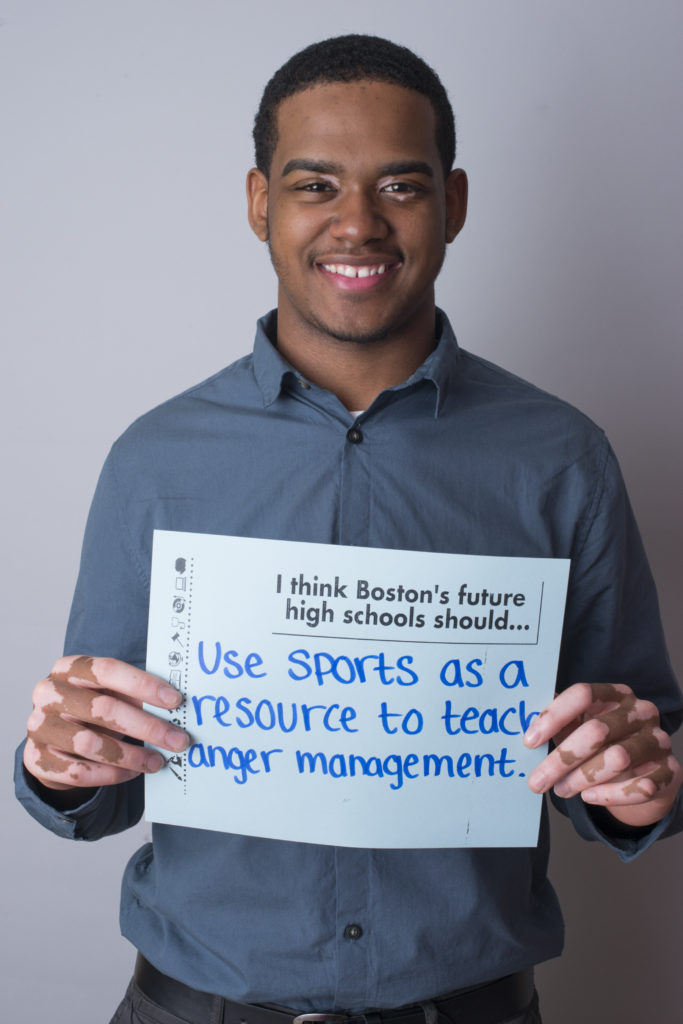
By Wilfredo Báez
There’s a lot of violence in the United States. I’m mostly talking about Boston. There are students in the Boston Public Schools who are in gangs. There are a lot of students with anger-management problems; they don’t know how to suppress their anger. Some reasons why kids join gangs include living in poverty, feeling revenge for the deaths of friends and family, or just not getting any attention at home. That’s when they turn to the “hood” where they get the most attention. I believe sports, primarily contact sports, can help these students stay off the streets and probably get rid of their anger, because they’ll be making friends with others (or people like them).
I was always giving people attitude when they told me what to do—teachers, tutors—everybody but my family members. After a while I noticed I was never mad when I was on the field.
I started playing sports at the age of eight when my mother signed me up for baseball because my father played (and now coaches) baseball. As I got older and learned about the real world, my old friends began to get into gangs and dropped out of school. Growing up, as I learned more and met new people, I became angry all the time. I was always giving people attitude when they told me what to do—teachers, tutors—everybody but my family members. After a while I noticed I was never mad when I was on the field. Playing baseball took me away from being on the streets. If playing baseball or other sports took me away from being on the streets, I believe it could help others, too.
What are the causes of after-school violence in teenage boys? Teenage boys decide to join gangs because they see gangs as their family, instead of their real family. According to Omar Ruiz, a family and marriage therapist in Boston and Counselling Coordinator at the Margarita Muniz Academy in Jamaica Plain, kids join gangs because they need to feel valuable or maybe they are being bullied and need to feel protected. Omar’s clients are usually African-American, Hispanic and Latino. He believes that using anger management classes supported by combat sports will help decrease the violence between gang members and other individuals. Being poor also influences the decision to join gangs.[1] In some families a teenage boy could be the “man” of the family and feel responsible for making money. So they sell drugs with the gangs. Also, according to Kowalski in her article “What Teens are Doing About Violence” “people with families with a history of violence have a higher risk of being involved in acts of violence”.[2]
Community based programs are another solution. In Boston, an organization in Roxbury called The BASE founded by Robert Lewis Jr. gives kids a place to go to get off the streets to play and practice baseball. In the process, kids learn team building and trust. “Eighty percent of the program’s enrollees are Latino and another 15 percent are African-American,” according to Lewis, who recruits players through high school coaches and youth baseball coordinators. Many come from families scarred by street violence. One former Boston Astros player turned his life around by leaving gang life for baseball and then pitching his Oklahoma junior college to a national title.”[3] The Base gives kids an opportunity to play baseball, but also encourages them to stay in school and go to college. “‘These kids have been underdogs their whole lives,” Lewis said. ‘They know how to find their way to a wake. But finding a college campus? Most of them are clueless.’” This is a free program, but it is only open to kids who stay in school. Before you can practice baseball, each student has to do thirty minutes of homework; homework help is available. Older students mentor younger ones and inspire them to keep going.
High schools should support community sports organizations. One way to do this would be to offer students the chance to be in a sports program instead of being suspended for causing trouble in school. This would help students learn discipline, how to work in groups, and how to more easily deal with their anger. Students with criminal records should be given the option of clearing their records by participating in community sports programs. This might even reduce the number of young men who wind up in jail.
- Omar Ruiz, in discussion with author, January 25, 2016. ↑
- Kathiann M. Kowalski, “What teens are doing about violence,” Current Health 27, no. 7 (2001). ↑
- Joseph P. Kahn, “The BASE Mentors Youth through Baseball, Academics,” Boston Globe (Boston, MA), June 1, 2014. ↑
You must be logged in to post a comment.